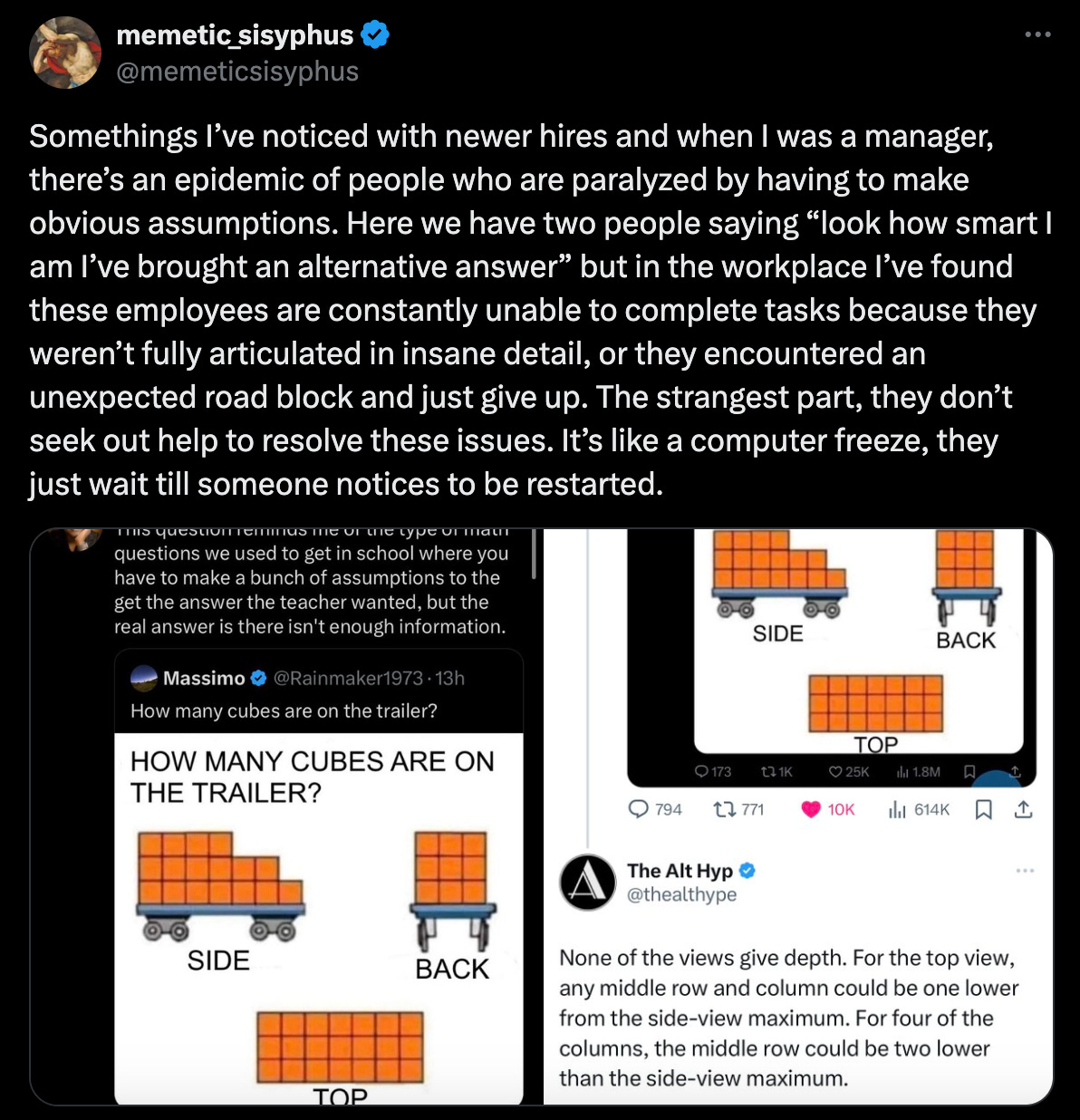One of the few true and unmitigated joys of middle age is bonding with my fellow Xennials about the catastrophic incompetence of the incoming generation of young adults — which is why I am devastated, in this case, to have to defend the Zoomers.
It starts (how else?) with a viral tweet:
Here is what this immediately made me think of: In my first assistant job after college (to which I commuted on the back of a brontosaurus), I worked for a woman who treated me like I was a feral idiot, basically. I have amazing stories from this job — the time she dumped a six-foot pile of files on my desk and told me to recycle them only after I had gone through and removed all the staples and paperclips is a particular favorite — but her biggest hangup by far was client communications.
Basically, when it came to important people, I was not supposed to exist. If one of them called and she was unavailable, I had to take a message and end the call as quickly as humanly possible. And on the rare occasions that I was allowed to talk to a client, I was given minutely detailed and explicit instructions about what to say and how to say it, because if I didn't… I don’t know. The apocalypse, possibly? My boss never really went into detail on that front — and obviously, in hindsight, I realize this was probably its own sort of learned behavior, a traumatic response to some bizarre fuckup by whoever had the job before I did.
But back then, I came to a totally different conclusion: the problem was me.
Even though I had been working since I was 14, I was now out of my depth, and whatever I thought I knew about how to communicate respectfully with important people, I didn't know enough. Or worse, maybe what I knew was actually totally backwards and wrong! The adult working world was a foreign land with unfamiliar conventions, and my boss had lived in it a lot longer than I had; who was I to question her? What the hell did I know? Maybe the stakes of these conversations really were impossibly high. Maybe I did need to have my every communication micromanaged like some kind of fucking lunatic.
All of which is to say, when I moved on to a new job the following year, it never occurred to me that actually, my boss might have been the lunatic — or that this ironclad rule of my previous job was nontransferable. I was trained. Institutionalized. I was the former resident of Shawshank prison, liberated but still asking permission to piss.
Cut to the moment when my new boss asked me to call the director of something-or-other to get this or that piece of information, and I responded, brightly, "Of course! How exactly should I do that?", and she looked at me like I had not only asked permission to piss, but had also asked if she would accompany me to the bathroom to help me take my pants off.
I'm pretty sure that both these women thought of me (and perhaps still do) as the living embodiment of the entitled millennial. The first one would be like, "that bitch thought she knew everything," and the other would be like, "that bitch didn't know how to do anything," and they'd both sort of have a point— just like there's probably some truth to the notion that Gen Zs go into shutdown mode when they encounter an obstacle, like a stalled robot vacuum cleaner.
But the idea that this is strange and inexplicable… eh. Is it? I developed my weird workplace habits because I worked for a crazy person for less than a year. Gen Z, meanwhile, have spent their lifetimes in a world of scheduled playdates and resume-enriching extracurriculars, appealing to authority figures to mediate their conflicts and regulate their sex lives, raised by parents who put spyware on their laptops and tracking devices on their phones, surrounded by "smart" objects that nobody knows how to fix if they break, and knowing that any mistake they make is apt to be captured on video and uploaded to the internet where it will ruin their job and dating prospects alike for all of eternity.
Does it suck that they grew up like this? Yes. Is it mystifying that they now suffer from such a crisis of confidence, and such a paralyzing fear of failure, that their default mode is to just not try at all? Probably not.
The worst thing about learned helplessness is that it is, you know, learned.






I'm thinking this could also tie into the whole "quiet quitting" and "lazy girl job" thing, too - meaning they're not keen on making decisions that they might have to answer for. In situations where their role isn't crystal clear, it's easier, less risky, and requires less accountability to just not do anything. Basically, if they're unsure of what to do, that's seen as your problem, especially if you're the one in a higher position, earning more, and thus bearing more responsibility.
"You must un-learn what you have learned," someone once said. Hard to do, this will be.